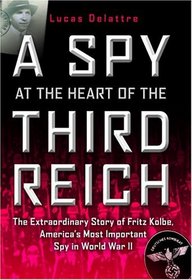A very interesting tale about a man who is often referred to in other books about spying in World War II, but is never really given a lot of space.
Fritz Kolbe was an ordinary German who worked in the Nazi Foreign Ministry. He decided to help the Allies and became the man the British called the most important spy of the war. He delivered over 2600 important documents to the OSS in Bern.
The book covers his activities as well as a number of others who resisted the Nazis, many of whom paid for it with their lives. However, the book is mostly about Kolbe, his personal and professional lives and family.
A fascinating story that the U.S. intelligence community has not taken the lead on as Kolbe was treated miserably by that community, both during and after the war. Only Allen Dulles, the OSS chief in Bern, believed in him from the beginning.
The man who emerges in the book is seen as an ordinary person who decides to resist. He has his faults and good points. He makes mistakes and succeeds through blind luck. And then he is satisfied that he has done his part, without the reward that others might expect.
One wonders why it is that a French journalist had to write this book, when Kolde's actions greatly helped the U.S. and Britain. Why is it that murdering Nazis (often SS officers) were spirited away to the U.S. and provided comfort and security but Kolbe was left without such?
Fritz Kolbe was an ordinary German who worked in the Nazi Foreign Ministry. He decided to help the Allies and became the man the British called the most important spy of the war. He delivered over 2600 important documents to the OSS in Bern.
The book covers his activities as well as a number of others who resisted the Nazis, many of whom paid for it with their lives. However, the book is mostly about Kolbe, his personal and professional lives and family.
A fascinating story that the U.S. intelligence community has not taken the lead on as Kolbe was treated miserably by that community, both during and after the war. Only Allen Dulles, the OSS chief in Bern, believed in him from the beginning.
The man who emerges in the book is seen as an ordinary person who decides to resist. He has his faults and good points. He makes mistakes and succeeds through blind luck. And then he is satisfied that he has done his part, without the reward that others might expect.
One wonders why it is that a French journalist had to write this book, when Kolde's actions greatly helped the U.S. and Britain. Why is it that murdering Nazis (often SS officers) were spirited away to the U.S. and provided comfort and security but Kolbe was left without such?




